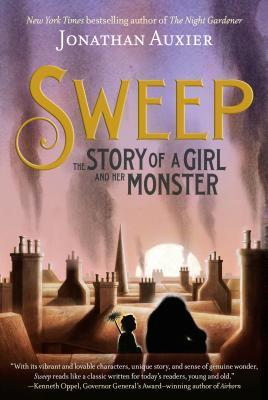Nan Sparrow has been a chimney sweep ever since she can remember, in Jonathan Auxier’s “Sweep: The Story of a Girl and Her  Monster” (Amulet 2018) set in nineteenth century London. In the beginning, the Sweep was her guide, but he disappeared five years ago. Now twelve, Nan is changing into a young woman while working for Wilkie Crudd, a cruel master with a pack of boy sweeps. They all live together in a coal cellar. The story and writing is reminiscent of Charles Dickens, specifically, Oliver Twist.
Monster” (Amulet 2018) set in nineteenth century London. In the beginning, the Sweep was her guide, but he disappeared five years ago. Now twelve, Nan is changing into a young woman while working for Wilkie Crudd, a cruel master with a pack of boy sweeps. They all live together in a coal cellar. The story and writing is reminiscent of Charles Dickens, specifically, Oliver Twist.
Nan is canny and lithe, but that doesn’t keep her from getting stuck in a narrow bending flue where a competitive boy “nudges” her—or shoves her deeper into the flue—when a chimney fire breaks out. Did she die? If not, where could she have escaped to? And who is with her?
The Sweep had given her a fistful of char—soot and ash—which has lived in her pocket these past 5 years. This clump of char begins to awaken and grow. The glob comforts and eventually protects her. It develops legs and arms and can move about. She names him Charlie. He’s sweet, innocent, but is growing larger and becoming frightening, but not to Nan. Nan protects Charlie from ridicule and her own fear. She doesn’t want him to become fearful. With research, she decides he’s a golem. Research also tells her that golems become obsolete—but what does that mean exactly?
Nan and Charlie move into the House with a Hundred Chimneys, which has lain vacant for years. They use an upstairs window as their front door. In fact, they prowl the city along the rooftops, which the reader will find exhilarating—at least this one did. They watch the streets below and stay hidden from the cruel Crudd who is searching for his best sweep, Nan.
Nan and Charlie assign each room with a purpose—the Tantrum Room (lined with cushions), a Dress-Up Room with all the capes and hats left by the previous owners, and the Rubbish Room, which becomes too smelly to use.
Back in the days when they’d roamed the streets together, the Sweep had sung to her, so now Nan sings. She sings to advertise her service—sweeping chimneys. And it’s effective in getting work.
Toby, a street boy and junk seller, is cocky and sweet and clearly fancies Nan. She’s dismissive of him, but the reader is grateful for Toby’s occasional presence in Nan’s hard life. Nan says, “Toby was one of those irritating people who got on with everyone.” Toby notes that Charlie woke up Nan’s heart—which had been pretty hardened.
At times the writing is lyrical, as when the sun comes out and Nan sees the light “erasing the shadows, street by street.” Reading this book is both comfortable and comforting.
The story addresses child labor of the late nineteenth century and the beginning of laws to protect children. The Sweep, Toby, and another friend, Miss Bloom, are all Jewish and the issue of anti-Semitism is an important thread running through the story. Together, Nan and Charlie, experience wonder, love, and grief—in spite of having no mother.
And on this Mother’s Day, I’m so grateful to the mother I had. Happy Mother’s Day, Mama.
Patricia Hruby Powell is the author of the award winning Josephine; Loving vs Virginia; and Struttin’ With Some Barbecue among others talesforallages.com
Leave a Reply